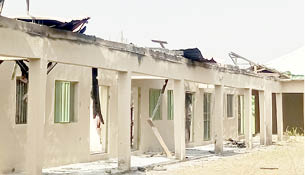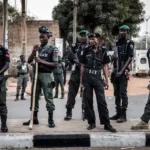At the inception, the idea of Integrated Quranic Basic Education of the government of President Goodluck Jonathan was to create a window of opportunity for many out-of-school children christened as ‘almajiri’ particularly in the North to have a blend of both Quranic and western education.
The subjects approved for teaching, according to the Strategic Implementation Committee Report sighted by Daily Trust, include English Language, Mathematics, Computer, Basic Science and Physical and Health Education, Vocational Studies and Social Studies, among other Islamic Religion subjects.
Concerned with the number of street-begging among school-aged children, particularly the Almajiri, the Niger State government under Mu’azu Babangida Aliyu keyed into the initiative and set up a committee in 2008 on the Integration of Quranic Schools with the western education system to find solutions to the negative phenomenon.
Years after the take-off of the project, Daily Trust findings showed that the 11 centres across Niger State are now an eyesore due to neglect by the successive administration between 2015 and 2023.
Hardship: Nigeria sitting on keg of gunpowder – Sultan
Reps ask FG to ban Styrofoam, single-use plastics
It was gathered that the government allegedly refused to fund the implementation committee.
Some members of the implementation committee told Daily Trust that challenges ranging from dilapidation of structures, lack of proper feeding of pupils in the designated boarding schools in Kwanayi and Kontagora, abandonment of the Implementation Committee, as well as insecurity, were the major factors that forced parents to withdraw their children.
Our correspondent, however, gathered that while some parents have re-enrolled their children in some conventional schools to continue with education, the majority of children have dropped out of school completely.
Investigation by Daily Trust revealed that in the first week of January 2024, 12 out of 16 classrooms at the Integrated Quranic Basic Education Centre, Kwanayi village, about 5km on Minna-Suleja Road were completely razed down by fire.
The Kwanayi Centre was one of the well-established boarding schools to allow almajiri children to spend quality time in the hostel to enable them to learn both religion and western education.
The fire was said to have started around 12am that fateful night but fire fighters could not gain access to the school to put the fire under control due to lack of access road.
Residents said the firefighting truck that was deployed by the Niger State Fire Service was stuck on the muddy road before reaching the school and could not be removed until four days after the incident.
The centre at Kwanayi has 16 classrooms, 5 offices and 2 staff rooms but roofing sheets were all blown off by windstorm before the fire incident razed down the rest.
Our correspondent who visited the Kwanayi School also reported that the overhead water tanks meant to serve the school had been brought down by windstorms for years. School now survives on only a one-hand pumped borehole.
Also, of the four hostels at the centre, only three beds in one of the rooms with the floor of the remaining hostels littered with animal faeces were seen.
The Head Teacher of the Almajiri School, Kwanayi, Paikoro LGA, Rabiu Isyaku, told Daily Trust that sometime last year, many parents withdrew their pupils for fear of insecurity, saying that the school was located far away from towns without electricity.
“In my centre, we have several challenges. Before now, we had about 185 pupils but as of now, our pupils are not up to 50. The reason is that of the security challenges and because it’s a boarding school, parents have withdrawn their children because the majority of them were coming from outside Minna, the state capital, especially the Kafin-Koro axis,” he said.
He said the parents were disturbed that the school is located far away from towns without electricity and started withdrawing their pupils.
“Even the remaining pupils that we have now were sourced from immediate villages around the school in order to keep the school alive.
“Also, as a boarding school, pupils needed to be fed. But when the ministry came on inspection and discovered that there were only a few pupils, they stopped the supply of food to the hostel. So, now we only operate as a day school because we cannot afford to feed the remaining pupils,” he said via a telephone interview.
The head teacher said three sets of pupils had passed out from the school and are now in secondary schools in various conventional public secondary schools.
While noting that when the population of pupils started declining, the Local Government Education Authorities transferred some teachers to other schools, he called on the government to put electricity in the school as well as fix the roofings that had been blown off by the windstorm.
Daily Trust also gathered that teachers could not reside in staff quarters due to lack of basic amenities, especially electricity, and as a result leave only pupils in the hostels under the care of three-night watchmen.
A parent, Isyaku Wali of Sabon-Kwanayi who had three children in the school, told Daily Trust that the major challenge is lack of electricity and pupils were using touch lights at night.
“If you go to that school at night, even as an adult, you would be scared because the place was always dark. Also, there is no access road to the school except for a footpath. A car cannot go to that school especially during the rainy season.
“When rainy season starts, we have to follow our children to help cross over a river everyday while going to school and due to inadequate food, parents provide food for children,” he said.
He however noted that staying in the hostel is better but children are being discouraged by lack of food.
Also, the Integrated Quranic Education Model School along Kontagora-Rijau Road had also been under lock due to security challenges in the area.
Residents said most pupils have also been in their houses since the closure while the structures have also been in an abysmal state.
Some members of the Implementation Committee led by the Emir of Suleja, Mallam Muhammad Awwal Ibrahim, confirmed to Daily Trust that most of the children have been out of school since the closure of most of the study centres.
At the centre located at Gurara-Junction, Minna-Bida Road, staff who didn’t want their names mentioned lamented over inadequate teachers, classrooms as well as teaching and learning materials to meet the teaching expectations of the 118 pupils in the school.
The Integrated Quranic Education (IQE) Centre, Odu-Oye Quarters, Minna, is equally faced with the challenge of acute water scarcity and lack of hostel accommodation for pupils for years.
Multiple sources told Daily Trust that the schools were doing fine until 2015 when the new government under Abubakar Sani Bello neglected the Emir of Suleja-led implementation committee.
It was gathered that the traditional ruler made several efforts to see to the progress of the schools but his efforts went in vain.
One of the memos seen by Daily Trust showed a request of N20 million to run the schools, of which approval was reportedly given by the former governor, but the money was never released.
Sources said currently the state cannot boast of a single functional Integrated Quranic Basic Education school out of the 11 study centres in Minna, Bida, Kontagora, Gulbin-Boka, Kwanayi, Mokwa, Suleja among others.
One of the committees’ members who spoke with our correspondent on condition of anonymity said, “Nobody talks about us again. Normally, we used to have monthly meetings with all the headmasters of all the schools. We have our secretariat that was rehabilitated by the Mu’azu Babangida-led administration. We were doing well before the immediate past administration came on board and neglected us.
“The Emir of Suleja, who is our chairman, has passion for the progress of those schools but the state government doesn’t care. We used to give each of the schools funds for feeding and the children used to be well fed.”
He disclosed that the school in Kontagora was built at the cost of N340 million, Bida and Kwanayi were built at N240 million each; the one in 123 Quarters, Minna was N75 million and those of Tungan-Mallam, Gulbin-Boka, Mokwa; were built at the cost of N52 million each.
He said the contracts were awarded directly by the federal government and their role was to show them the land and supervise the works.
“And the job was done and handed over to us and we were maintaining it until when the administration of Abubakar Sani Bello stopped funding the committee and the schools were not even run effectively again,” he said.
Another member of the committee said the teachers have no one to report to again, the watchmen at the secretariat were laid off and termites have almost destroyed the secretariat.
“If you go to the secretariat now, you will feel like shedding tears, wondering if it is government property,” he said.
However, Daily Trust gathered that the responsibility of funding of the Aliyu Yerima Integrated Quranic Education school in Bida has been taken over by the Etsu Nupe and Chairman, Niger State Council of Traditional Rulers, Alhaji Yahaya Abubakar who pays N100, 000 monthly to the school account for upkeep.
Some of the reports of the Implementation Committee submitted to the Niger State government sighted by Daily Trust showed that as at 2020, the population of the 11 Integrated Quranic Education Centres in Kontagora, Bida, Minna, Mokwa, Gulbin-Boka, Suleja grew to 2, 269 pupils.
In October 2009, the baseline data of Quranic schools as contained in the census report of the Niger State Committee for Integration of Quranic Schools with Western education system in the state which was sighted by our correspondent showed a total number of 8, 870 Quranic schools, with 17, 892 teachers and 689, 736 pupils across the 25 LGAs.
Reacting, the Niger State Commissioner for Basic and Secondary Education, Dr Hadiza Asabe Mohammed, said the current administration in the state was working to reposition the schools to a befitting standard.
She said mega schools would be built to accommodate the tsangaya children.
Similarly, the Executive Chairman, Niger State Universal Basic Education Board, Mallam Muhammad Baba Ibrahim, said the current administration is doing everything possible to revive the Tsangaya schools as part of efforts to achieve an all-inclusive education agenda.
“For out-of-school children, I think the statistics that have been in circulation, we don’t want to say it is authentic and as well we cannot say it’s not authentic. We want to authenticate the existing statistics.
“But then, we understand that there are children that are supposed to be in school but are out of school and there are measures that have been put in place. We have Integrated Quranic and Tsangaya education,” he said.

 Join Daily Trust WhatsApp Community For Quick Access To News and Happenings Around You.
Join Daily Trust WhatsApp Community For Quick Access To News and Happenings Around You.

